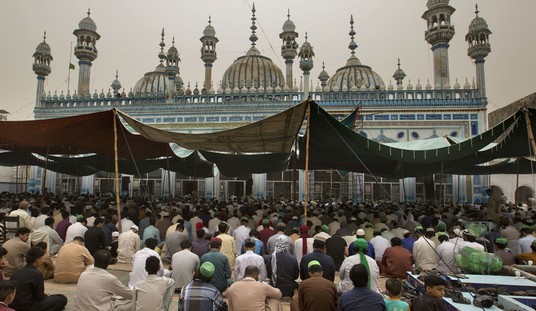If the Kim regime is bluffing, consider it called, at least for now. In a press availability during a historic meeting with Uzbekistan president Shavkat Mirziyoyev at the White House, reporters asked whether Donald Trump had any response to North Korea’s threats to walk away from the summit if denuclearization was the demand. “We haven’t heard anything,” he replied, but made it clear that denuclearization was not coming off the table:
"We haven't seen anything, we haven't heard anything," Pres. Trump says in Oval Office on recent developments ahead of North Korea summit. "We will see what happens." https://t.co/kbZQA5Q1fs pic.twitter.com/4Wz6AMICHb
— ABC News (@ABC) May 16, 2018
After North Korea suddenly canceled a meeting with South Korea and threatened to pull out of a summit with President Trump next month, reporters asked Mr. Trump if North Korean leader Kim Jong Un is bluffing.
“We’ll have to see, we’ll have to see,” Mr. Trump said Wednesday during a White House meeting with Uzbek President Shavkat Mirziyoyev.
Mr. Trump was asked several questions about North Korea, to which he repeatedly said, “We’ll have to see.”
“We haven’t seen anything, we haven’t heard anything, we will see what happens. Whatever it is— it is,” Mr. Trump said.
Not too many reporters picked up on the rest of Trump’s response. CNN’s Kevin Liptak provided a more complete answer:
Trump affirmed that he was committed to insisting on the denuclearization of the Korean peninsula, though you may not have heard it over the shrieks of press aides asking reporters to leave the room.
— Kevin Liptak (@Kevinliptakcnn) May 16, 2018
Trump’s answer appears to indicate that, for now, North Korea is posturing publicly but not privately. The New York Times picked up on the escalation on the public track, with their #2 diplomatic officer singling out John Bolton as a potential barrier to holding the talks:
Kim Kye-kwan, a vice foreign minister, rejected the administration’s demand that it quickly dismantle its nuclear program as Libya had done 15 years ago, singling out John R. Bolton, Mr. Trump’s new national security adviser, for condemnation.
“If the United States is trying to drive us into a corner to force our unilateral nuclear abandonment, we will no longer be interested in such dialogue and cannot but reconsider our proceeding to the D.P.R.K.-U.S. summit,” the statement said, using the abbreviation for the North’s formal name, the Democratic People’s Republic of Korea.
Mr. Kim said his country would never follow the path of Libya and Iraq, which he said met a “miserable fate” at the hands of “big powers.”
He said North Korea had “shed light on the quality of Bolton” in the past, “and we do not hide our feelings of repugnance towards him.”
North Korea had previously signaled flexibility about the military exercises, appearing to remove a perennial obstacle to talks between North and South Korea. But the North cited its objections to the joint American-South Korean air force drill in postponing a separate high-level meeting with South Korea that had been planned for Wednesday.
If it’s true that the US hasn’t heard anything in its diplomatic channels about North Korean objections, then it may well show that this is nothing more than a bluff, or at worst an attempt to shape the media battlefield ahead of talks. I wrote yesterday about why someone with little experience in dealing with heads of state might need to jab for a while to test his opponent. If that’s the case, then Trump making clear that the US position won’t change just to take a meeting is the proper response.
But what if it’s more of the traditional Pyongyang shuffle, as Jazz considered this morning? If that’s the case, then it won’t matter how Trump reacts in the short run. Japan and South Korea aren’t going to show up for talks to bless a nuclearized North Korea, and the sanctions are still in place anyway. Trump may have set himself up for some political damage if this falls apart, but it’s not going to be nearly as much damage as a bad deal or retreat through concessions to get a deal would create. North Korea’s new belligerence gives Trump the opportunity to act like the gracious grown-up, and at least for today, he’s taking advantage of that opportunity.
The swipes at Bolton and the reference to Gaddafi are likely just rhetorical tools. The Gaddafi issue existed well before Kim began talking about reconciliation and the end of the nuclear-weapons development program, and Bolton came from the US administration that kept its word to Gaddafi on his deal. Whatever pressure Kim felt to change his tune over the last few weeks hasn’t changed, and won’t without Kim agreeing to some sort of deal that involves denuclearization. The likelihood of such a deal working out was always going to be very low, but this temper tantrum doesn’t mean that the process is coming to an end yet. As Trump said … we’ll see.








Join the conversation as a VIP Member